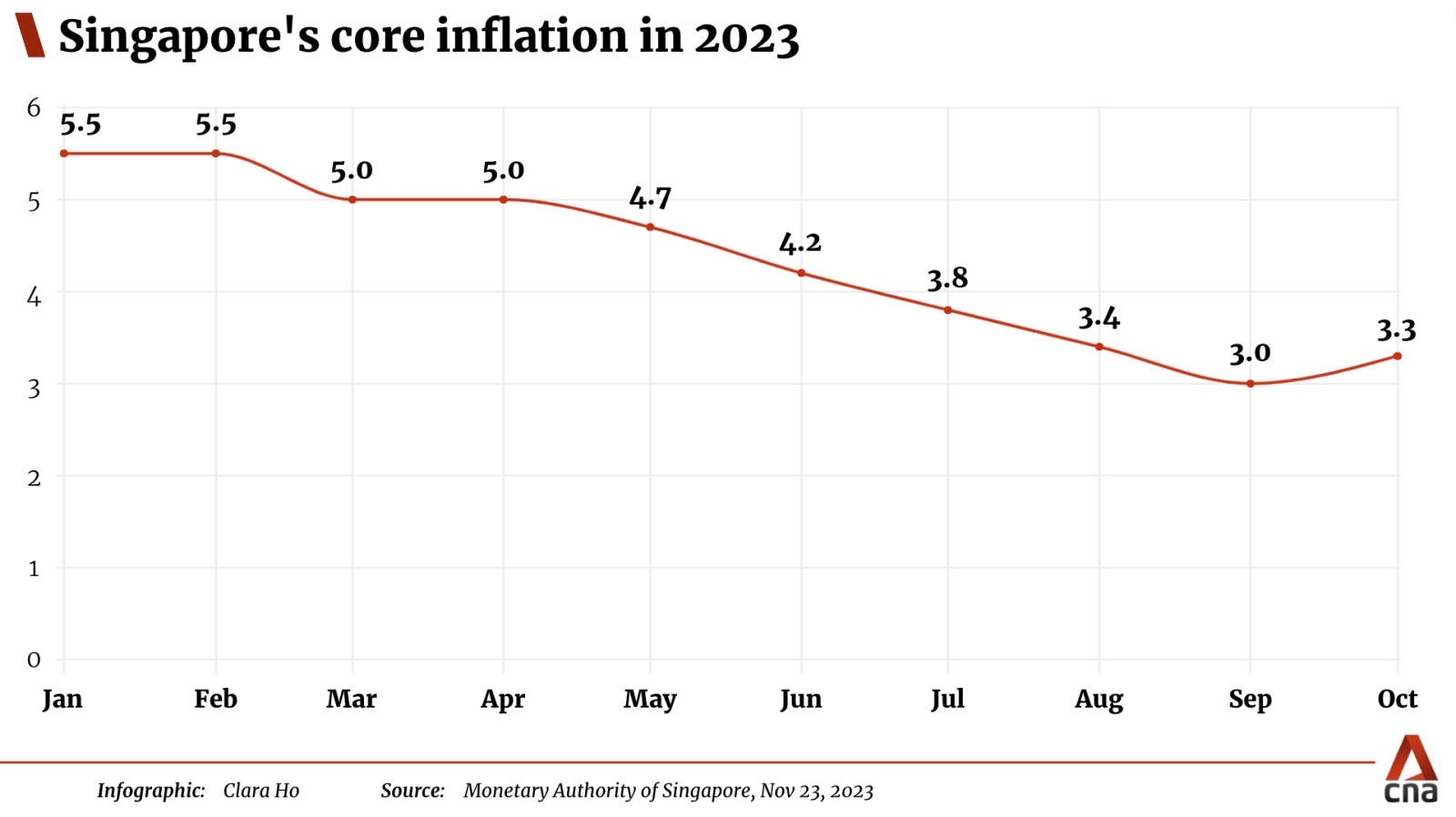Singapore’s core inflation rises to 3.3% in October

A wet market in Singapore on Aug 30, 2023. (File photo: iStock/gracethang)

This audio is generated by an AI tool.
SINGAPORE: Singapore's core inflation rose to 3.3 per cent year-on-year in October, official data showed on Thursday (Nov 23).
The increase was due to higher inflation for services, retail and other goods, as well as a rise in electricity and gas costs, the Ministry of Trade and Industry (MTI) and the Monetary Authority of Singapore (MAS) said.
Core inflation had risen to 5.5 per cent in January and February this year, a 14-year high, before trending downwards. Singapore's core inflation fell to 3 per cent in September, the lowest since March 2022.
Core inflation excludes accommodation and private transport costs.
Overall inflation rose to 4.7 per cent year-on-year in October, up from 4.1 per cent the previous month.
The increase reflected higher private transport inflation, in addition to the rise in core inflation, said MTI and MAS.

SECTORS
Services inflation rose to 3.4 per cent in October, up from 3.1 per cent in September, mainly due to a larger increase in holiday expenses. Tuition and other fees, as well as outpatient and hospital services costs, also grew at a faster pace.
Retail and other goods inflation increased to 1.6 per cent in October, as prices of personal care products and medical goods rose more strongly. The prices of clothing and footwear also fell at a slower pace.
Electricity and gas costs rose 1.8 per cent in October due to higher tariffs.
Food inflation eased to 4.1 per cent in October as the prices of non-cooked food and prepared meals saw smaller increases.
Private transport inflation rose to 11.7 per cent in October from 8.5 per cent in September, driven by a faster pace of increase in car prices.
Accommodation inflation in October edged down to 4.2 per cent in October as the pace of increase in housing rents moderated.
OUTLOOK
Global crude oil prices have been volatile, falling sharply in recent weeks after having risen earlier, said MAS and MTI.
Global prices for most food commodities, as well as intermediate and final manufactured goods, have continued to moderate.
"These factors, alongside the stronger Singapore dollar trade-weighted exchange rate, should further temper Singapore’s import cost pressures in the quarters ahead."
Locally, unit labour costs are expected to rise at a slower pace, in tandem with the gradually cooling labour market.
"Businesses are likely to continue passing through higher labour costs to consumer prices, but at a more gradual pace," said MAS and MTI.
Core inflation is projected to fall to between 2.5 and 3 per cent year-on-year by December.
In early 2024, core inflation is expected to be impacted by the increase in the Goods and Services Tax (GST) rate and seasonal effects.
"However, core inflation should resume a broadly moderating trend over the course of 2024, as import cost pressures decline and tightness in the domestic labour market continues to ease," said MTI and MAS.
Overall inflation could see more fluctuations in the remaining months of 2023, amid recent swings in Certificate of Entitlement (COE) premiums.
Over the course of next year, overall inflation is expected to decline as private transport inflation slows in tandem with an expected increase in COE quotas. Accommodation inflation is also forecast to ease as completed housing supply increases, said MTI and MAS.
For 2023 as a whole, overall inflation is expected to average about 5 per cent, while core inflation is expected to average about 4 per cent.
In 2024, overall inflation is projected to average 3 to 4 per cent, while core inflation is expected to average 2.5 to 3.5 per cent.
Excluding the transitory effects of the 1 percentage point increase in the GST rate to 9 per cent, overall inflation is expected to come in at 2.5 to 3.5 per cent, while core inflation is forecast to be between 1.5 and 2.5 per cent.
"Upside risks remain, including from fresh shocks to global energy and food commodity prices due to geopolitical conflicts and adverse weather events, and more persistent-than-expected tightness in the domestic labour market," said MTI and MAS.
"At the same time, there are also downside risks such as a sharper-than-projected slowdown in the global economy, which could induce a greater easing of cost and price pressures."















